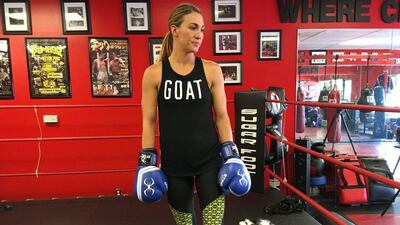Mikaela Mayer knew she was better than the high school burnout that she was in danger of becoming.
She had attended four schools in three years, repeatedly getting in trouble for fighting and bad grades. She was a 17-year-old occasional model with the self-awareness to realise she had no clear direction or future outside the San Fernando Valley.
“All I cared about was my friends, and going out and partying, and being a young, cool teenager,” Mayer said. “I was looking for something, but I had no idea what.”
One summer day, she realised something was calling her to the humble storefront kickboxing gym in an unassuming strip mall down the street from her divorced dad’s apartment. Instead of driving past it again, Mayer and a friend went inside.
The first thing she asked the trainer was: “Do you think I’m too old to start competing?”
“I was hungry for success in something at that time, because I wasn’t doing well at anything,” Mayer said. “I was like, ‘I want to be good at something.’ It’s always been inside me. I’ve always had that fire. I didn’t have anywhere to direct it.”
Almost nine years to the day after that wild child learned how to throw her first punch, Mayer will fight at the Rio de Janeiro Olympics, joining gold medallist Claressa Shields as the only US women boxers in Brazil.
Mayer still doesn’t know exactly why she first decided to punch people after a youth spent participating in everything from football (soccer) to motocross to snowboarding. Nobody in her self-described “family of hippies” had been anywhere near a boxing gym.
After her first workout, she knew three different ways to throw a proper punch. And she liked it.
“I poured all my energy into it,” Mayer said. “It wasn’t ever just a part-time thing for me. From the day I walked into this gym, within two months, all I thought was, ‘I want to be the best female fighter in the world.’”
Mayer took lessons in muay thai and kickboxing, but she dedicated herself to boxing after a back injury temporarily stopped her from throwing kicks. She became a Golden Gloves champion just a few years later – and when the Olympics added a women’s tournament in 2010, Mayer and her father, Mark, decided to chase medals.
They heard about a boxing scholarship programme at Northern Michigan University under revered amateur coach Al Mitchell, who has taught three US Olympic teams. Before she had time to think, the Los Angeles native had been accepted to the programme on Michigan’s upper peninsula.
“So I quit my job, said, ‘later’ to my boyfriend at the time, and hopped on a plane,” Mayer said. “I had never been to Michigan, let alone the UP (upper peninsula), which is another thing on its own. I remember flying in there and seeing all the pine trees and 10 feet of snow and just thinking, ‘Where the (heck) am I?’”
Mayer warmed to her cold new home, and Mitchell developed his first female pupil into a world-class fighter. Her bond with Mitchell and his fiancee became so tight that she had Mitchell’s initials tattooed on her right hand.
“The thing that makes Mikaela different is her commitment,” Mitchell said. “When she walked in here, I broke her down and rebuilt her. She never believed it was too hard, and she never gave up. She has toughness that got her this far, and now it’s getting her all the way to the Olympics. It’s an incredible thing to do in that amount of time.”
A year after moving to Northern Michigan, Mayer fell just short of a spot on the first US women’s team, losing a decision to Queen Underwood at the 2012 trials. She only became more determined to catch the next wave in the evolution of her sport.
Mayer made the Rio team last fall only after fending off a ferocious challenge over three qualifying fights from teenage prodigy Jajaira Gonzalez, a fellow LA-area native with a wealth of junior titles.
“The competition is so much tougher now than it was when I started,” Mayer said. “Back in 2009, if you went to a tournament and even got to have two fights, it was worth the money.”
With an artfully bent nose from boxing, she still takes occasional modelling work, particularly for a handbag company that sponsors her. Although she still lives in Michigan, Mayer returned to her original Valley gym last month, joyfully greeting her first coach – and Coconut, the adorable dog she gave up when she moved.
She wants an Olympic medal out of her journey, but she also wants her success to bring more attention to women’s boxing. Although she has thought about turning pro, good money is scarce for female fighters outside the mixed martial arts octagon – but that only makes Mayer more determined to succeed in Rio.
“I’ve always believed I’d be here, but I also knew that the chances of being here were going to be slim,” Mayer said. “This was my dream before I knew it was possible.”
Follow us on Twitter @NatSportUAE
Like us on Facebook at facebook.com/TheNationalSport

